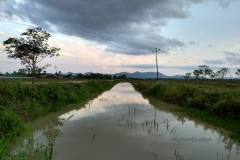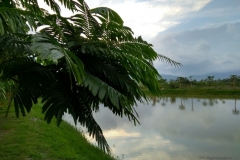I often met an old man in his 80’s sitting alone on the banks of the Loktak lake in the early evenings before the Covid-19 lockdown. I used to wonder at his solitude every time I saw him when the sun almost hid behind the hills in the West and the evening breeze blowing across the Tamu soothed passersby by the lake.
When the lockdown started in February, the initial shock of the pandemic drove me slightly paralysed that I didn’t go out for days other than going to the engkhol a kilometre away from our present house. I was perturbed by the number of people gathered in shops, konthongs and sumang. I avoided talking to people and silently performed my daily tasks of watering the vegetables in the evenings and returned home at sunset.
The initial shock subsided after the government announced the state Covid free, bringing out more people, more shops and more vehicles on the streets. In lieu of engkhol visits which my parents picked up, I started cycling towards Loktak and Tamu, sometimes to Thanga and Keibul. The general crowd had increased and people who came out for evening walks had increased manifold. But I was also occasionally greeted by police patrol in their open jeep forcing people to go back home and stay indoors. The old man was no longer seen on the banks of Tamu and the thought of his disappearance struck me. He must have been told to stop going out by his family members. But what did I know? I too stopped cycling since the cycle was actually a borrowed one and had to be given up. Even though more and more people thronged the streets and shops, I avoided company mostly, solitude felt strangely comforting yet lonesome.
Few weeks of complete isolation and home quarantine, everyday hubbub in the family, personal health issues, financial hurdles, an ever expanding pandemic crisis caused a spike in my anxiety. Breathing exercise, mild physical workouts was able to calm me down partially, but I realised it was not enough. I cut down my smart phone and social media usage and decided to give more focus on reading, writing, research work and gardening. Productivity shot up but also left my body and mind burnt out leaving me in the lookout for recuperative process each day. I was aching to escape from the noise of honking cars, raucous vehicle engines and my daily engagements.
I started going out in the evenings like I used to do some years back, to the deserted farms, fields and grounds. I often took photos of trees, sky, hills and sat or walked as long as I felt like. It worked; it rejuvenated me, it eased my anxiety and filled my loneliness with a different kind of company, not of people but of a powerful sense of connection to the soil, grass, air, water, flowers, trees, hills and the sky. And soon the walks became part of my daily life.
Each evening I cannot wait to go out, away from concrete roads and houses and people. But as the fear of the pandemic spreads even in our small town, the police barricading certain roads and locations, I am not certain how long I can keep up my evening walk routine.
And sometimes I think about the old man who is no longer seen on the banks of the lake. Is he visiting a more secluded place like I do, closer to nature?
Engkhol – Kitchen garden
Konthong – gate
Sumang – courtyard










